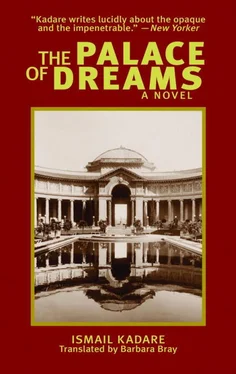“Anyhow, it’s true to say the Tabir Sarrail has now recovered all its old authority,” said the elder of the uncles.
“For my part,” observed Kurt, “even though I am a Quprili, I’ve never thought it could easily be undermined. It’s not only one of the oldest State institutions—in my opinion it’s also, despite its charming name, one of the most formidable.”
“It’s not the only one that’s formidable,” objected one of the cousins.
Kurt smiled.
“Yes, but in the other ones the terror’s obvious. The fear they inspire can be seen for miles, like a cloud of black smoke. But with the Tabir Sarrail it’s quite different.”
“And why, in your opinion, is the Palace of Dreams so formidable?” asked Mark-Alem’s mother.
“It isn’t so in the way you may suppose,” said Kurt, with a covert glance at his nephew. “I was thinking of something else. If you ask me, of all the mechanisms of State, the Palace of Dreams is the most remote from human will. Do you see what I mean? It’s the most impersonal, the blindest, the most deadly, and so the most autocratic.”
“Even so, I reckon it too can be kept more or less under control,” said the other cousin.
He was bald, with dim eyes that reflected his intelligence in a very peculiar way; they seemed simultaneously to reveal and to be consumed by it.
“In my opinion,” Kurt went on, “it’s the only organization in the State where the darker side of its subjects’ consciousness enters into direct contact with the State itself.”
He looked around at everyone present, as if to assess the effect of his words.
“The masses don’t rule, of course,” he continued, “but they do possess a mechanism through which they influence all the State’s affairs, including its crimes. And that mechanism is the Tabir Sarrail.”
“Do you mean to say,” asked the cousin, “that the masses are to a certain extent responsible for everything that happens, and so should to a certain extent feel guilty about it?”
“Yes,” said Kurt. Then, more firmly: “In a way, yes.” The other smiled, but as his eyes were half closed you could see only a bit of his smile, like a shaft of light from under a door.
“All the same,” he said, “I think it’s the most absurd institution in the whole Empire.”
“In a logical world it would be absurd,” said Kurt. “But in the world as it is it’s quite normal!”
The cousin laughed heartily, but gradually stifled his mirth when he saw the governor’s face darken.
“Yet it’s rumored everywhere that things are more complicated than that,” said the other cousin. “Nothing is ever as clear as it seems. For example, who can say nowadays what the Oracle of Delphi was really like? All its records have been lost—or rather destroyed. And it wasn’t as easy as all that to get Mark-Alem taken on….”
Mark-Alem’s mother was listening attentively to all this, trying to catch every word.
“1 think you’d better change the subject,” said the governor.
It wasn’t as easy as all that to get me taken on…. Mark-Alem thought to himself. And gradually there came back to him scenes from his first morning at the Tabir, when he’d been so lost and bewildered, together with glimpses of the tedious hours he’d spent today, working in Selection. I suppose he thinks I shot straight to the top of the tree! he laughed bitterly to himself.
“Come, let’s talk about something else!” said the elder of the two uncles again.
At this point Loke came and announced that dinner was served, and everyone got up and went into the dining room.
At table the governor’s wife started talking about the customs in her husband’s province, but Kurt, none too politely, interrupted her.
“I’ve invited some rhapsodists to come here from Albania,” he said.
“What!” cried two or three voices.
They obviously meant “Where on earth did you get that idea? What bee have you got in your bonnet now?”
“I was talking to the Austrian ambassador yesterday,” Kurt continued, “and do you know what he said? He said, ‘You Quprilis are the only great family left in Europe, probably in the world, who are the subject of an epic.’”
“Ah,” said the elder of the uncles, “now I see!” “According to him the epic devoted to us is in the same class as the Nibelungenlied, and he said, ‘If a hundredth of what is sung about you in the Balkans were still sung today about a French or German family, they’d shout it from the housetops as their highest claim to fame. Whereas you Quprilis scarcely deign to notice it.’ That’s what he said.”
“I see,” repeated the other uncle. “But there’s one thing I don’t understand. You mentioned Albanian rhapsodists, didn’t you? If you’re talking about the epic we all know, what have Albanian rhapsodists got to do with it?”
Kurt Quprili looked him straight in the eye but didn’t answer. Debate about the family epic was as ancient as the priceless antique vases, the gifts of various sovereigns, that were piously handed down from one generation of Quprilis to the next. Mark-Alem had heard his relations talking about the epic since his earliest childhood. At first he’d imagined the epos, as they called it, as a long thin animal, midway between a hydra and a snake, which lived far away in some snowy mountains, and which, like a beast of fable, carried within its body the fate of the family. But as he grew older he gradually realized what the epic really was, though still in a confused sort of way. He couldn’t quite see how it was that the Quprilis lived and lorded it in the imperial capital, while people recited an epic about them in a faraway province called Bosnia in the middle of the Balkans. Why in Bosnia and not in Albania, where the Quprilis originally came from? And above all, why was it sung not in Albanian but in Serbian? Once a year, during the month of Ramadan, some rhapsodists would come from Bosnia. They would stay with the Quprilis for several days, reciting their long epics to their own plaintive musical accompaniment. It was a custom that had lasted for hundreds of years, and recent generations of the Quprilis hadn’t dared to drop or even modify it. They would gather in the great guest hall and listen to the dronings of the Slav bards, not understanding a single word except Tchuprili, the visitors’ pronunciation of the family name. Then the rhapsodists would receive their usual reward and go home again, leaving behind them an atmosphere of emptiness and unsolved mystery, in which for several days their erstwhile hosts would heave vague sighs, like those provoked by a sudden change in the weather.
Rumor had it, however, that the Sovereign was jealous of the Quprilis because of the epic. Dozens of diwans and poems had been written in his honor by the official poets, but nowhere had anyone composed an epos about him like the one the Quprilis had inspired. It was even said that this jealousy was one reason for the thunderbolts the Sovereign regularly unleashed upon the Quprilis.
“Why don’t we just give the epic to the Sultan and avert such troubles once and for all?” little Mark-Alem had suggested one day after hearing the grown-ups repining.
“Hush!” said his mother. “An epic isn’t something you can present to someone else. It’s like a wedding ring or the family jewels—something you can’t give away even if you want to.”
“He said it was in the same class as the Nibelungenlied, ” repeated Kurt pensively. “And for days I’ve been pondering the question we’ve all asked so often: Why have the Slavs composed an epic in our honor, while our compatriots the Albanians don’t mention us in their epic?”
“Nothing simpler,” said one of the cousins. “They don’t say anything about us because they expected something of us and they were disappointed.”
Читать дальше












